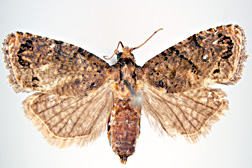This page has been archived and is being provided for reference purposes only. The page is no longer being updated, and therefore, links on the page may be invalid.
|
|
ARS Scientists Help Fight Damaging Moth in Africa
By Dennis O'BrienDecember 10, 2009
Agricultural Research Service (ARS) scientists have launched a preemptive strike to combat the false codling moth, a major pest in its native Africa.
If the moth enters the United States, it will damage citrus, corn, cotton and a wide range of nuts and fruits, according to entomologist James Carpenter, at the ARS Crop Protection and Management Research Unit in Tifton, Ga. He is working to control the moth in Africa, thereby reducing the risk of its arrival in the United States—and ensuring a future weapon if it does show up.
Carpenter and an international team of scientists have turned to a tried-and-true method of pest control: the sterile insect technique (SIT). Using this technique, both male and female insects are irradiated. The female insects are left sterile by the irradiation and are unable to produce offspring. The males are completely or partially sterilized; if they are able to produce offspring, the offspring are sterile. By repeating the process, the target insect population eventually declines.
Originally developed by ARS scientists to control screwworms, SIT is now used to control Mediterranean fruit flies, pink bollworms and a number of other moths and pests.
Carpenter began working with South African scientists several years ago to develop SIT to control false codling moths and to test the methods in South Africa’s citrus groves. In a series of studies, Carpenter and his colleagues found that irradiating adult false codling moths sterilized the females and ensured that males produced only sterile offspring. The research has been largely funded by the Food and Agriculture Organization of the United Nations and the International Atomic Energy Agency, which is dedicated to finding peaceful uses for nuclear energy.
Carpenter also helped South African scientists establish a facility in a rural village where codling moths are reared, chilled, irradiated and transported for release in the orchards. In a year of operations, sterilized moths released aerially and by hand drastically reduced moth populations in South Africa’s Western Cape region. The sterile moths also are available for shipment to the United States if they are needed here. A report on this work was recently published in Area-Wide Control of Insect Pests.
ARS is the principal scientific research agency of the U.S. Department of Agriculture (USDA). This research supports the USDA priority of promoting international food security.

